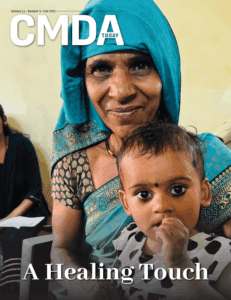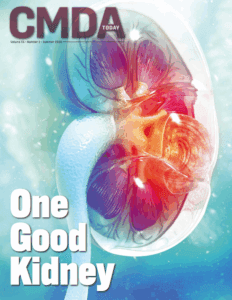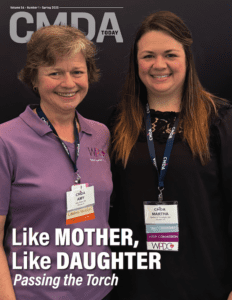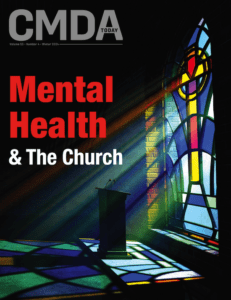Preparing our Students and Residents to Stand Strong
Plenty of clever people are beginning to say some sensible things, although the ruling elite are hardly listening at all. Most of the clever people who immediately recognized the significance of the fiasco at Harvard University involving Claudine Gay nevertheless analyzed it in terms of an ill-thought-out affirmative move in line with the currently dominant
by Jeff Barrows, DO, MA (Ethics)
In 1972, the National Opinion Research Center at the University of Chicago found approximately 90 percent of Americans self-identified as Christians in their General Social Survey.[1] Over the next several decades, the percentage of Americans self-identifying as Christians has steadily dropped to the point that the Pew Research Center estimates similar surveys conducted in 2020 will find 64 percent of Americans identifying as Christian.[2] Further projections reveal that if present trends continue, by 2070, the percentage of Americans identifying as Christian will lie between 35 percent to 54 percent. With each passing decade, Christianity is closer to becoming a minority faith in America.
One age group in which the disaffiliation rate is exceptionally high includes those under 30. This is of particular concern to us at CMDA, because this age group represents our future membership and also the future of healthcare in America. Among the multitude of reasons young people are abandoning the Christian faith is the culture’s increasing emphasis and promotion of individual autonomy over obedience to any behavioral directives found within Christianity, especially those related to sexuality. Carl Trueman masterfully detailed this rise of autonomy in his book The Rise and Triumph of the Modern Self: Cultural Amnesia, Expressive Individualism, and the Road to Sexual Revolution.[3]
In recognition of this existential threat, in 2020, the CMDA Board of Trustees prioritized the development of a curriculum that would enable our resident and student members to “winsomely” defend a biblical stance on several cultural hot-button issues, including homosexuality, abortion and transgender identification. The view of the board was that if our students and residents could be equipped with a solid foundation to “winsomely” defend biblical positions on these issues, it would increase their ability to withstand the increasing cultural pressures contained within healthcare education to accept these positions as normal. Therefore, the primary goal of the curriculum would be equipping participants to gently challenge the premises of someone holding anti-biblical positions so they may begin to question their way of viewing the world.
This curriculum, Standing Strong in Training, is now complete and available online at cmda.org/standingstrong. The curriculum is designed for group discussion, allowing the students and residents to role-play interactions with individuals who support abortion and the new sexuality, including the increasing myriad of gender identities. It comprises seven video modules, each accompanied by a leader guide to help facilitate discussions.
The curriculum begins by addressing one of the significant reasons individuals are increasingly abandoning the morality in which they were raised: the deferment to intuition as outlined by Jonathan Haidt in his book The Righteous Mind.[4] In his many studies examining how people make moral decisions, Haidt discovered that when someone is initially faced with a new moral question to consider, they typically defer to their intuition rather than rationally thinking through the question to arrive at an answer based on previous teaching. He uses the illustration of an elephant and a rider, with the elephant representing intuition and the rider representing the rational thinking of that person. Haidt concludes that “elephants rule.” In other words, we typically decide on the morality of a new situation based on our intuition, which comes from our experience. Rarely does a person engage their rational thinking or consult some other authority, such as the Bible, as they work through a new moral query. Therefore, the resulting decision is often at odds with the rational frameworks under which they were raised, such as the Bible. The good news is intuition can be overcome, but it requires concerted effort.
To winsomely defend biblical values, individuals must consciously decide the foundational beliefs and presuppositions they will utilize to shape their lives. This can also be referred to as what worldview they will adopt, and it is a decision that can be made only by the individual themselves. Christian parents hope and pray their adult children will assume a Christian worldview incorporating a high view of Scripture. That is also our hope at CMDA for our students and residents. That is why the second and third modules press into worldviews, encouraging attendees to solidify their beliefs around foundational questions, presuppositions and worldviews.
Trueman points out that all existing worldviews can eventually be condensed into two foundational worldviews contrasting on whether our universe is created or came into being by sheer accident.3 The difference between these two worldviews is vast, with profound implications for how we should live in this world. The premise of this curriculum is that to defend biblical values on controversial topics winsomely, the person must first consciously adopt a biblical worldview while also gaining an understanding of the life implications contained within an accidental worldview.
For example, a preset structure and built-in values will always exist within a created worldview. While that structure and associated values may differ between different created worldviews depending on the religion, their existence defines and, to varying degrees, explains suffering in the world. In the biblical worldview, suffering is often, but not always, associated with disobedience to God’s commands, especially as they relate to His creation.
This understanding is especially helpful when dealing with human sexuality. The biblical worldview holds that God created humans such that expression of sexuality should be confined to the lifelong covenant of marriage between a man and a woman. When sexuality is expressed outside those confines, harm is likely to result. While that harm can be viewed as an extension of God’s wrath and punishment, it can also be viewed as the natural harm that occurs due to violating creation’s structure and built-in values.
The illustration I use within the curriculum is that of a car. Every car has a designer and thus also has a preset structure and built-in values. That’s why every car comes with an owner’s manual that lays out recommended maintenance procedures according to a particular schedule. Those procedures and schedules will differ depending on the model of the car, but they are nonetheless necessary for the proper functioning of the car. If a car owner chooses to ignore those procedures, such as regularly ignoring the need to add oil to the engine, eventual harm will come to the car. That harm results from the disregard and breach of the values and structure of that car arising from its design.
This perspective on sexual sin is beneficial in giving a winsome response to our biblical view of sexuality. Rather than framing alternative views of sexuality and sexual behavior as simply against God’s law (which, of course, they are), the winsome response frames the issue in terms of design and structure. Once again, the primary goal of this winsome response is not to convert or change; rather, it is to challenge the other person’s thinking and move them to examine their worldview.
The other significant difference between created and accidental worldviews is the strategy for achieving success and flourishing in life. Within the created worldview, flourishing is attained through understanding and adherence to the structure and built-in values within the creation. In the Christian worldview, that understanding is gained through the study of both the Old and New Testaments, followed by applying and obeying pertinent biblical principles. Within the accidental worldview, the universe simply consists of raw material. There is no inherent structure and certainly no built-in values. Therefore, a person within that worldview achieves their vision of flourishing through manipulating creation to achieve whatever they desire.
Another analogy to help understand this difference is that of a building. The creation worldview sees that building as containing doors, walls and supporting structures that cannot be moved. Therefore, the best utilization of that building is to adapt to the physical structure and design their living space according to existing doors and rooms. However, the person who adopts the accidental worldview sees that building essentially as Lego building blocks that can be moved and altered to fit their own personal desires. One current application of moving Lego blocks is the efforts of gender idealogues to change the physical body to match an internal sense of gender.
After taking the first three modules to develop and emphasize the differences between these two foundational worldviews, the following three modules deal separately with the issues of the beginning of life, biblical sexuality and transgender identification. The attendee is encouraged to avoid superficial arguments surrounding these topics and instead address them from a worldview perspective. This is accomplished by equipping the attendee to respond to provocative questions with a statement of their personal belief rather than a reactive response that only further provokes the other person.
Take, for example, a question posed to a Christian medical student by one of their peers along the lines of, “How can you possibly support bans on abortion that take away a woman’s reproductive rights?” This clearly provocative question is loaded with unbiblical presuppositions. If the student has not proactively prepared themselves for that question, they are likely to either react with an unhelpful answer or, by their silence, appear to cave to the social pressure.
If the student has prepared themselves to answer the question from their foundational beliefs, they could respond with an answer such as: “I believe both you and I are created beings and that our life began at fertilization. Further, I believe each individual life has an immeasurable value that is ignored and taken away if a woman chooses to end her pregnancy through abortion.” While that answer may not convince the interrogator to change their position on abortion, it serves to gently challenge some of their errant presuppositions while also giving a clear and compelling response to the provocative question.
This same type of foundational response is applied to the issues of premarital sex, homosexual behavior and transgender identification. Here are some suggested responses found within the curriculum:
“I believe that God has given us a wonderful gift in our sexuality…one that brings us great pleasure if used in the right way, but also great pain if used outside God’s design.”
“While I believe that the suffering of patients with gender dysphoria is genuine, I also believe that God has created us male and female and that He doesn’t make mistakes. Therefore, I believe the best way to help a patient with gender dysphoria is through specialized counseling that deals with any associated mental health issues.”
The curriculum concludes by examining the presuppositions of the Christian worldview to develop a winsome defense for conscience freedoms, such as refusal to avoid complicity with evil through engagement in effective referral or participation in procedures that induce harm. The Christian worldview offers clear principles regarding conscience, such as the commandment to maintain a clear conscience before God found in 1 Peter 3:15-16. The example of first-century Christians giving their lives to maintain a clear conscience before God provides abundant motivation for today’s students and residents to stand strong against the increasing cultural pressures to adopt unbiblical positions.
The threat of losing the next generation to prevalent cultural values of the day has been with us since the resurrection of Christ. Still, that threat has never been greater than now with the overwhelming toxic mix of social media and other technological distractions. Therefore, it is incumbent on us, who are grounded in biblical values, to support and train those who follow behind. May the Lord use this and other similar resources to help the next generation stand strong for the Lord!
About The Author
Dr. Jeffrey Barrows serves as Senior Vice President of Bioethics and Public Policy for Christian Medical & Dental Associations. Dr. Barrows is an obstetrician/gynecologist, author, educator, medical ethicist and speaker. He completed his medical degree at the Des Moines College of Osteopathic Medicine and Surgery in 1978 and his residency training in obstetrics and gynecology at Doctors Hospital in Columbus, Ohio. In 2006, he completed a master’s in bioethics from Trinity International University in Chicago, Illinois. Dr. Barrows was called out of full-time practice in 1999 to help administrate Christian Medical & Dental Associations’ Medical Education International (MEI) ministry. He served as the director of MEI from 2002 to 2005 before transitioning into the fight against human trafficking. He has dedicated 15 years of his career to fighting against human trafficking within the intersection of trafficking and healthcare, as well as the rehabilitation of survivors of child sex trafficking. Dr. Barrows has trained healthcare professionals on how to recognize and assist victims of trafficking within healthcare and has published numerous book chapters and articles. He has testified to the Ohio legislature on numerous anti-trafficking bills and is a speaker on human trafficking to the media, the church and in other venues. In 2008, Dr. Barrows founded Gracehaven, an organization assisting victims of domestic minor sex trafficking in Ohio. In 2014, he served as a member of the Technical Working Group on health and human trafficking under the U.S. Department of Health and Human Services’ Administration for Children and Families. In addition, he is a founding board member of HEALTrafficking. In 2020, Dr. Barrows published a novel entitled Finding Freedom that realistically portrays child sex trafficking in the U.S.
Learn More
As the newest edition to CMDA’s long list of resources for our members, Standing Strong in Training is new curriculum that helps healthcare students and residents stand up against the cultural pressures facing Christians within healthcare today. To learn more, visit cmda.org/standingstrong.
[1] National Opinion Research Center. (2019). General Social Surveys, 1972-2018: Cumulative Codebook. University of Chicago. https://gss.norc.org/documents/codebook/GSS_Codebook_intro.pdf
[2] Pew Research Center. (2022). Modeling the Future of Religion in America. https://www.pewresearch.org/religion/2022/09/13/modeling-the-future-of-religion-in-america/.
[3] Trueman, C. R. (2020). The Rise and Triumph of the Modern Self: Cultural Amnesia, Expressive Individualism, and the Road to Sexual Revolution. Crossway.
[4] Haidt, J. (2012). The Righteous Mind-Why Good People Are Divided by Politics and Religion. Vintage.




